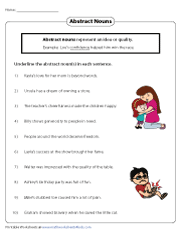
Let’s stop being abstract and look at some specific examples so we can get a better understanding of abstract nouns. So, all abstract nouns are “things.” Remember, though, that abstract nouns only refer to intangible things such as emotions, ideas, philosophies, and concepts. Even nouns that refer to fictional characters and places, such as Godzilla or Valhalla, are not, the reasoning goes, abstract nouns because these things would have a physical form if they were actually real. After all, people and places are real things that exist in our world. Unlike most other nouns, abstract nouns don’t refer to people or places. What about those nouns that you can tangibly sense? Learn more about concrete nouns here. Luck is an abstract noun because it refers to an intangible concept rather than a physical object that we can experience with our senses. Luck doesn’t exist as a physical object you can’t eat luck nor can you go to a store and buy luck. On the other hand, the word luck refers to a complex idea about how likely it is that good or bad events are going to happen to someone. Abstract nouns refer to intangible things that don’t exist as physical objects.įor example, the word cat refers to a cute animal. You cannot see, smell, hear, taste, or touch abstract nouns. These nouns refer to the people and physical objects that we interact with.īut what about the things that we can’t actually see or touch? Aren’t words like love, victory, and alliance nouns, too? Yes, they are, and there is a term you may not remember from your grade-school days that we use to refer to these things: the abstract noun.Īn abstract noun is “a noun denoting something immaterial and abstract.” Another common way to think about abstract nouns is that they refer to things that you cannot experience with the five senses.

And there are, of course, several different types of nouns that we use to refer to all of the things we experience during our lives: We eat food. You probably know that a noun is a word that refers to a person, place, thing, or idea-this is a grammar concept we learn pretty early on in school.


 0 kommentar(er)
0 kommentar(er)
